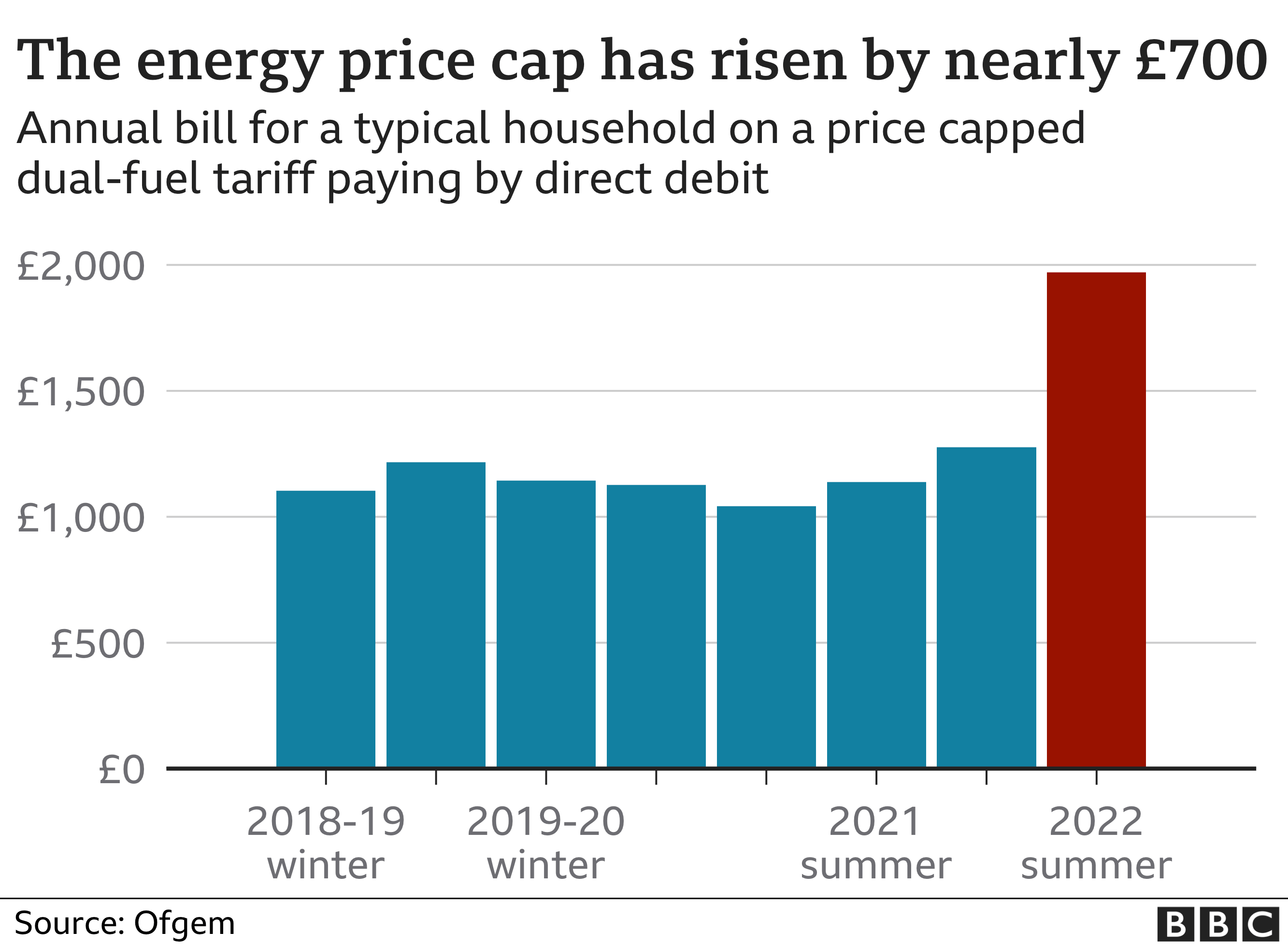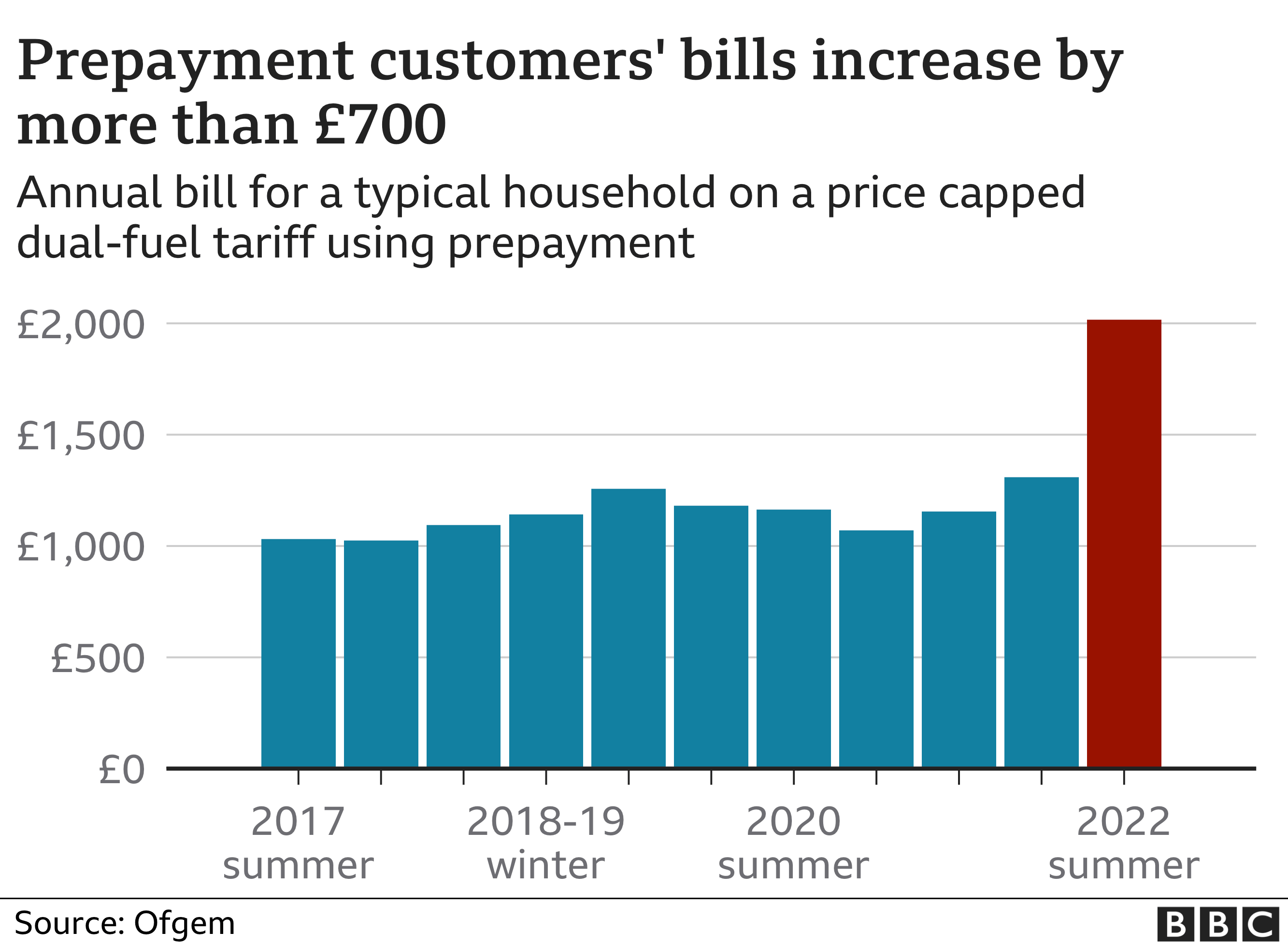Energy bills to rise by 54% a year for millions
 Image source, Getty Images
Image source, Getty ImagesMillions of people will pay an extra £693 a year on their energy bills from April, a rise of 54%, Ofgem has said.
The regulator's new price limit means 18 million households in England, Wales and Scotland will typically pay £1,971 a year for gas and electricity.
Another 4.5 million people on prepayment meters will see an even bigger increase of £708 a year.
Chancellor Rishi Sunak has outlined plans to soften the blow via council tax rebates and help with bills.
This would provide the majority of families with a total of £350 to help them adjust to higher prices, he said.
That will be split, he said, into a £200 rebate on energy bills for households from October, which will be paid back over next five years at £40 per year starting in April 2023. Analysts suggest bills could rise again that month.
Meanwhile, in England, households in council tax bands A to D - information you can find on your bill - will get a £150 discount from April, the chancellor added. Funds for the equivalent discounts would be provided to devolved nations in the UK.
The Bank of England has also increased interest rates from 0.25% to 0.5%, which will make borrowing money more expensive for individuals, but is designed to keep a lid on rising prices.
Soaring energy bills are the key factor in what the Resolution Foundation think-tank has described as a "cost of living catastrophe" facing people across the UK this year.


Tell us how you have been affected by the issues raised in this story.
- Email: haveyoursay@bbc.co.uk
- WhatsApp: +44 7756 165803
- Tweet: @BBC_HaveYourSay
- Please read our terms & conditions and privacy policy

Jonathan Brearley, chief executive of Ofgem, said: "We know this rise will be extremely worrying for many people, especially those who are struggling to make ends meet, and we will ensure energy companies support their customers in any way they can."
Food bills are also rising, and a increase in National Insurance will leave millions with a higher tax bill from April.
Typical of those affected is 24-year-old Michael Ball, from Kirkcaldy.
 Image source, Michael Ball
Image source, Michael BallHe pays for his electricity via a pre-payment meter. He has already taken certain steps to reduce his energy bills, like washing his clothes at his Mum and Dad's house nearby.
"I do worry about money a lot. It's a big burden and this news is something that makes me feel anxious," he said.
He said he might have to move back in with his parents if his energy bills continued to rise.
"If I lose my independence, my own space, I worry about how it might affect my finances and mental health."
How the cap works
The cap, which is announced every six months, sets the prices that suppliers can charge for each unit of energy as well as the standing charge. This is then translated into the expected annual bill for a household that uses the typical amount of gas and electricity.
That does not mean there is a limit to how much people can pay. The more gas and electricity that is used, the higher the bill.
Anyone who is on a standard variable tariff, whose fixed deal has come to an end (or is about to), and those moved because their old supplier went bust will be affected by the new higher cap.
It means the typical bill will rise by 54% as analysts suggest the next cap, scheduled for October, could add hundreds of pounds more onto a typical bill this coming winter.

There is a separate cap for 4.5 million people on prepayment meters, for whom there will be a rise from £1,309 a year to £2,017 in April for a typical household bill.
Energy firms are struggling under the weight of surging wholesale gas prices. The new cap will allow them to pass some of that cost onto customers.
Ofgem's announcement was brought forward as part of a coordinated approach of announcements about the cost of living.
Labour's shadow chancellor Rachel Reeves criticised Mr Sunak for not scrapping VAT on energy bills.
She said that despite the chancellor's pledges the "uncomfortable truth" was that families in Britain would still be paying hundreds of pounds more for energy after April.
She described the grants to power companies as a "buy now pay later scheme that loads up costs for tomorrow".



No comments